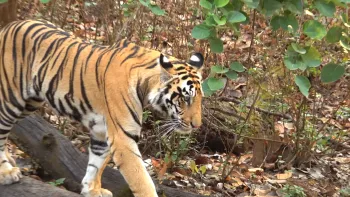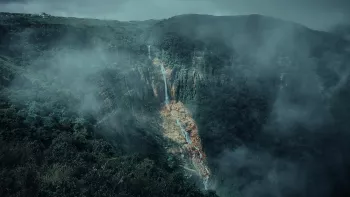Teide National Park Travel Guide
Teide National Park, located on the island of Tenerife in Spain, is renowned for its volcanic landscape dominated by Mount Teide, the highest peak in Spain. The park is a UNESCO World Heritage Site and attracts visitors with its unique geological features, diverse flora and fauna, and stunning views. This destination is a must-visit for nature lovers, hikers, and those interested in geology.Top Attractions in Teide National Park
- Mount Teide - The iconic volcano and highest peak in Spain
- Teide Observatory - A renowned astronomical observatory
- Roques de Garcia - Spectacular rock formations
- Montaña Blanca - Popular hiking trail
- Teide Cable Car - Offers breathtaking views of the park
Teide National Park is Famous for
Its towering volcano, Mount Teide, and unique geological formations are what make Teide National Park famous and a top tourist destination.Top Attractions in Teide National Park
- Exploring volcanic landscapes
- Hiking trails with stunning views
- Stargazing at the Teide Observatory
- Photographing the unique rock formations
- Experiencing the diverse flora and fauna
What's Great about Travelling to Teide National Park?
- Perfect for nature enthusiasts
- Great for hikers and outdoor adventurers
- Unique geological features for geology buffs
What's Not So Great about Travelling to Teide National Park?
- Not ideal for beach lovers
- Limited accommodation options within the park
- High altitude may not suit everyone
Travel Tips for Teide National Park
- Check weather conditions before hiking
- Book Teide Cable Car tickets in advance
- Respect the park's rules and regulations
Important Teide National Park trip information
- Ideal Duration: 2-3 days to explore the park
- Best Time to Visit: Spring and autumn for pleasant weather
- Nearby Airports and Railway Stations: Tenerife South Airport and Santa Cruz de Tenerife Railway Station
Per Person
22,500
*EXCLUDING APPLICABLE TAXES 4.8 Ratings
( 33 Reviews )
( 33 Reviews )
Per Person
35,000
*EXCLUDING APPLICABLE TAXES 5.0 Ratings
( 438 Reviews )
( 438 Reviews )
Per Person
16,500
*EXCLUDING APPLICABLE TAXES 5.0 Ratings
( 28 Reviews )
( 28 Reviews )
Per Person
2,82,000
*EXCLUDING APPLICABLE TAXES 5.0 Ratings
( 438 Reviews )
( 438 Reviews )
Per Person
24,400
*EXCLUDING APPLICABLE TAXES Per Person
34,990
*EXCLUDING APPLICABLE TAXES FAQ's on Teide National Park
Q1: What is the best time to visit Teide National Park?
The best time to visit Teide National Park is during the spring (April to June) and fall (September to November) when the weather is mild, and the landscape is in full bloom. However, if you want to experience snow-capped peaks, winter (December to February) is ideal. Summer can be crowded with tourists, but it offers clear skies for stargazing. Consider visiting on weekdays to avoid the weekend rush.
Q2: Do I need a visa to travel to Teide National Park?
As Teide National Park is located in Spain, EU/EEA citizens do not need a visa for short visits. Travelers from other countries may require a Schengen visa. It is advisable to check the specific visa requirements based on your nationality before planning your trip.
Q3: What are the must-visit attractions in Teide National Park?
The must-visit attractions in Teide National Park include the iconic Mount Teide, the Roques de García rock formations, the cable car ride to the summit, and the stunning Teide Observatory. Don't miss the mystical Lunar Landscape of Llano de Ucanca and the vibrant flora and fauna of the park.
Q4: Is Teide National Park a safe place to travel?
Teide National Park is generally safe for tourists. However, it's essential to follow safety guidelines, especially when hiking or exploring the rugged terrain. Avoid isolated areas, stay on designated paths, and be aware of changing weather conditions. Petty theft can occur in crowded tourist spots, so keep your belongings secure.
Q5: What is the local currency in Teide National Park and can I use credit cards?
The local currency in Teide National Park is the Euro (€). Credit cards are widely accepted in major establishments, but it's advisable to carry some cash for smaller vendors and rural areas. ATMs are available in nearby towns, so plan accordingly for your expenses.
Q6: What is the local cuisine like in Teide National Park?
The local cuisine in Teide National Park and the Canary Islands is a delightful mix of Spanish, African, and Latin American influences. Try traditional dishes like papas arrugadas (wrinkled potatoes), mojo sauce, fresh seafood, and local cheeses. Vegetarians will enjoy the variety of tropical fruits and vegetable-based dishes available.
Q7: What transportation options are available in Teide National Park?
Transportation options in Teide National Park include rental cars, public buses, guided tours, and taxis. Renting a car is convenient for exploring the park at your own pace. Public buses connect major towns to the park entrance. Taxis are available for shorter journeys, while guided tours offer informative insights into the park's history and geology.
Q8: Are there any cultural norms or etiquette I should be aware of when visiting Teide National Park?
When visiting Teide National Park, respect the local customs and traditions. Greet people with a smile and a handshake, maintain modest clothing when visiting religious sites, and avoid loud behavior in natural areas. It's customary to try local dishes and engage with the friendly locals to get a true taste of the Canarian culture. Remember to ask for permission before taking photographs of individuals.
Q9: I am a travel agent. How can I buy travel leads of Teide National Park?
Register yourself as a travel agent at agents.tripclap.com and then you can buy travel leads to Teide National Park once your account is approved. For more details contact our support team at +91-8069186564 or support@tripclap.com






